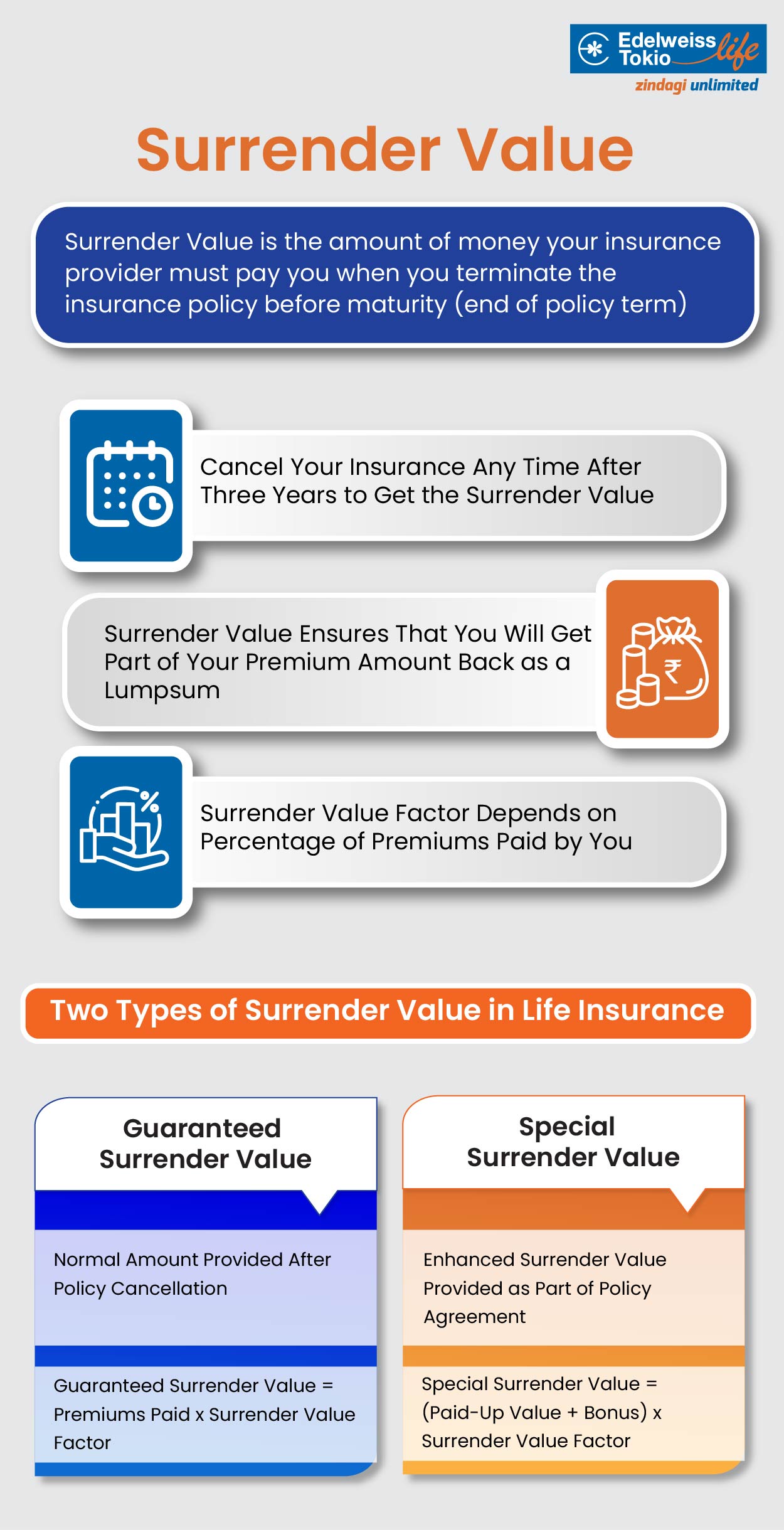Surrender Value of Life Insurance Policy
Blog Title
26337 |
In simple words, Surrender Value is the specified portion of sum paid by the life insurance company when you, as a policy holder, decide to terminate a policy before its maturity.
Is there an emergency cash need that can only be fulfilled by surrendering your policy? Or maybe the policy you bought five years back no longer meets your requirements? Are you unsure if you can surrender the policy right now or are not certain about the charges that this surrender may incur? Before we answer your questions, it is important to understand the basics involved.
What is the Meaning of Surrender Value?
The surrender value of an insurance policy is the amount which the insurance company will pay you (the policyholder) back when you decide to terminate the policy before maturity.
There is often a misconception that it is not possible to surrender your term insurance. As per a directive issued by the Insurance and Regulatory Development Authority (IRDA), term plans in India provide the option to give up on your policy at any time. Occasionally, a surrender (discontinuance) charge might be levied upon the policyholder for premature termination of the policy. However, these charges are not applied if the policy is renounced after five years.
After the policyholder has paid premiums consistently for three years, a regular premium policy acquires certain surrender value. Once you opt to exit the insurance policy, all the rights, benefits, and interests linked with it, including the protection cover, will cease to exist. But you will be paid back the surrender value that your policy has accumulated over the years.

Types of Policy Surrender Values
There are two types of surrender values – guaranteed surrender value and special surrender value. Let’s look at each of these values in detail!
1. Guaranteed Surrender Value – This is the value that is typically stated in the policy brochure/documentation. You are entitled to the sum if you have paid the premium for three years in a row. The sum is equivalent to all premiums paid up to this point, except the initial payment and any premiums paid for extra benefits or riders. Any bonus money you might have received upon the plan's maturity will not be included in the surrender value of the policy. Guaranteed surrender value is determined by multiplying the total premiums paid by the surrender value factor (the percentage of total premiums paid). When the insurance is close to its maturity period, the surrender value factor will almost be equal to 100% of premiums paid.
2. Special Surrender Value – The total sum assured, premium payments, policy term, and bonuses all affect the special surrender value of the plan. In situations where the policyholder fails to make premium payments, but the plan remains in effect until they decide to surrender it, the special surrender value is determined. The sum insured may be lesser when premium payments end, and the lesser amount is referred to as the paid-up value.
How is Surrender Value Calculated?
Guaranteed Surrender Value – Calculations for guaranteed surrender value are quite straightforward. For example, assume that you have paid Rs 40,000 in premiums and your surrender value factor is 30%.
Guaranteed Surrender Value = Premiums Paid x Surrender Value Factor
Guaranteed Surrender Value = 40,000 x (30/100)
Guaranteed Surrender Value = INR 12,000
Special Surrender Value-
Let us take a similar example with the same numbers to calculate your special surrender value. Say you take a policy with yearly premiums of INR 10,000 for a period of 10 years, and the sum assured is INR 2 lacs. After 4 years of premium payments, you decide to stop paying the premiums.
You Pay (Only 4 Premiums) |
INR 10,000 per year x 4 |
Sum Assured |
INR 2,00,000 |
First you will need to calculate your Paid-Up Value:
Paid-Up Value = Original Sum Assured x (No. of Premiums Paid / No. of Premiums Payable)
Paid-Up Value = 2,00,000 x (4/10)
Paid-Up Value = 2,00,000 x (2/5)
Paid-Up Value = INR 80,000
Your surrender value factor will once again be 30%. The surrender value factor is always 0 for the first three years, meaning that you will get no money if you surrender your policy before three years. Various companies decide their own surrender value factor, but usually it is the percentage of premiums paid over the course of your insurance term. For example, if you stop paying premiums in/ from the fourth year, and we can assume that your policy’s surrender value factor is 30%. Additionally, let’s assume that in the four years you earned a bonus of INR 30,000.
Use this information to calculate your special surrender value:
Special Surrender Value = (Paid-Up Value + Bonus) x Surrender Value Factor
Special Surrender Value = (80,000 + 30,000) x (30/100)
Special Surrender Value = 1,10,000 x (30/100)
Special Surrender Value = INR 33,000
Do All Policies Have a Surrender Value to Offer?
It is important to be aware of the terms and conditions if you decide to surrender a life insurance policy. For example, policies like term insurance plans do not provide any compensation or surrender value if you decide to cancel the policy in the middle of the term. However, for insurance plans like Unit-Linked Insurance Plans (ULIPs) and Endowment Plans, you will receive a surrender value provided that you have paid your premiums for at least three years.
When is it okay to Surrender your policy?
There are multiple reasons for why you might want to surrender your insurance policy. One of the most common reasons for surrendering a policy is that the policyholder no longer has the income to keep paying premiums. If paying premiums is becoming a financial liability instead of an asset, then surrendering your policy might be the right choice.
Another reason might be that the policyholder no longer has dependents to safeguard in case of their passing. You might also want to surrender your current policy if you find another insurance plan that better suits your needs and offers superior coverage.
FAQs
1. How is the surrender value calculated?
Surrender value is calculated by multiplying your total premium paid with the surrender value factor. In case of special surrender value, the amount is calculated by multiplying the paid-up value and bonuses with the surrender value factor.
2. What is the advantage of surrender value?
Surrender value allows you to cancel your insurance policy midterm without having to completely lose out on all your premium payments. While you will not get all your premium amount back, the accumulated surrender value ensures that a part of the money you paid, along will the bonuses your earned, will be returned to you upon termination of the policy.
3.What is the distinction between surrender value and cash value?
Cash value is a portion of your insurance policy that gains interest over time and can even be withdrawn as a temporary loan if you need extra funds for any event or emergency. On the other hand, surrender value is only provided when you terminate your life insurance policy before maturity.
4. Who pays the surrender value?
The insurance company itself will pay the full surrender value if you cancel the policy anytime before maturity.
5. How much money will I receive if I surrender my insurance after two years?
Most insurance policies only calculate surrender value after three years, meaning that you will not receive any surrender value if you cancel your policy after just two years. However, some insurance companies might have their own formula for calculating surrender value, so please check your provider’s terms and conditions before making any decisions.
6. Will I recover my entire premium if I surrender my term plan?
No, you will not recover your entire premium upon surrendering your policy. Calculations for surrender value may differ from company to company, but generally you will only receive a portion of the premium you have paid. You may also receive bonuses depending on the terms of your insurance policy, but generally, the value of the surrender value is always lower than the value of the total premiums paid.
Aastha Mestry - Portfolio Manager
An Author and a Full-Time Portfolio Manager, Aastha has 6 years of experience working in the Insurance Industry with businesses globally. With a profound interest in traveling, Aastha also loves to blog in her free time.












